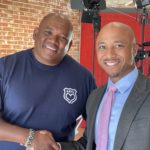D.O.P.E. Spotlight Interview – Civil Rights Attorney Lorenzo Banks
 A Mathematician Turned Lawyer
A Mathematician Turned Lawyer
How does a mathematics major with a low opinion of lawyers become a criminal defense attorney? It starts when he gets sued over a dispute with a credit card company. “I was not trying to be a lawyer,” Lorenzo says. “I knew nothing about lawyers, but I knew I couldn’t afford to hire a lawyer. So, I had to represent myself.”
Lorenzo went to work learning about the laws concerned with debt collection, wage garnishment, and the rules of civil procedure. He learned he had the right to demand discovery in his case — that is, he had a right to ask the credit card company to reveal their evidence against him. They never produced it, and when Lorenzo asked the court to dismiss the case, the judge granted the motion. He won! “They weren’t going to deal with this little mathematician in Oklahoma City who was not worth the trouble,” Lorenzo says.
In graduate school, Lorenzo had the opportunity to study law. At first, he thought he’d become a tax attorney because of his skill with numbers. “Then I read the tax code. No thanks,” Lorenzo says. When he encountered the case law associated with the search and seizure and self-incrimination, he became intrigued.
“When I learned about all those things nestled explicitly and implicitly within the Bill of Rights when it comes to your protection from the government, I was hooked,” Lorenzo says. “And it led me into the courtroom defending clients charged with crimes.”
Discovering Injustice Within the Justice System
After representing several underprivileged clients, Lorenzo says he gained a “very clear picture of the poor state of the criminal justice system here in the United States.” Socioeconomically depressed defendants cannot afford the same representation as defendants with means, and the unfair reality is that people of color are much more likely to be socioeconomically depressed. That means there is an institutional racial bias in the criminal justice system.
Lorenzo says that two of the primary reasons many people get into trouble with the law is that they don’t know their rights, and they don’t know how to handle encounters with law enforcement, particularly during traffic stops. When it comes to police encounters, “most people don’t know the law; they’re going off of what they’ve seen on television.”
Now Lorenzo gives frequent community seminars on what rights civilians have — and what rights they do not have. Civilians absolutely have the right to remain silent, and they do not have to consent to a warrantless search of their car or property. On the other hand, civilians do not have the right to disobey a lawful order from a law enforcement officer, and that includes being instructed to get out of a vehicle — whether they are the driver or a passenger. Police also have the right to detain you and arrest you, and they don’t always have to tell you why.
When people fight with cops or try to flee, that’s when things turn violent or deadly. Lorenzo encourages people who feel they are being treated unfairly by law enforcement to “comply with dignity.” “Make sure you are blameless,” he says, “so no matter what the opposite side does, you can gently and respectfully declare your rights, which will help you if you face criminal charges, and it will help you if you file civil rights claim against the officer.”
Joining the D.O.P.E. Movement
While Lorenzo frequently finds himself adverse to law enforcement officers in a court of law, he acknowledges that the vast majority of officers are good people doing important work. For him, the trick is arming people with the knowledge required to survive an encounter with a bad law enforcement officer with their rights intact.
When Stan Campbell, retired police officer and founder of D.O.P.E., asked Lorenzo to be a part of the program, he jumped at the opportunity. “As much as Stan loves his fellow brothers and sisters of law enforcement, he knows there have been mistakes and that there is room to grow,” Lorenzo says. “I also recognize that civilians make mistakes during police stops that contribute to the problem. So, if we can educate the police officers and the people, we can make a difference.”
That’s what D.O.P.E., which stands for De-escalating Officer Patrol Encounters, is all about. It’s about working with law enforcement agencies to develop strategies to bring down the tension during stops, and it’s about educating the public regarding how to cooperate with law enforcement officers in a respectful way that preserves their own civil rights. Attorney Lorenzo Banks provides an important voice in the D.O.P.E. movement
 SHAWN VINCENT – LITIGATION CONSULTANT
SHAWN VINCENT – LITIGATION CONSULTANT
Shawn Vincent is a litigation consultant who helps select
juries in self-defense cases, and he manages public interest
of high-profile legal matters. If you have any questions for
Shawn, or would like topic specific articles, please send your
request to dopethemovementinfo@gmail.com attention Shawn Vincent Articles


